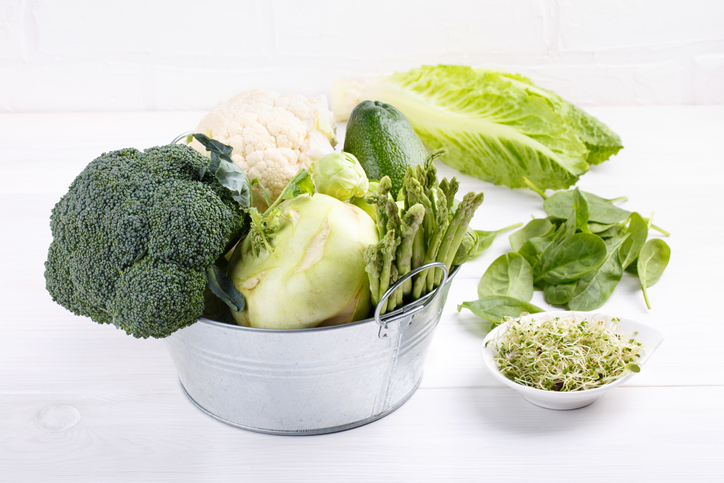Attention all plant-based protein seekers! Did you know that vegetables can be a great source of protein too? That’s right, you don’t need to rely on meat to get your daily dose of this vital nutrient. So, next time someone tells you that vegetables don’t have enough protein, you can prove them wrong with these tasty and nutritious options. Here are some protein-packed veggies that will blow your mind:
- Broccoli – This green powerhouse is not only rich in fiber and vitamin C, but it also contains about 3 grams of protein per cup. That may not sound like much, but every little bit counts!
- Brussels Sprouts – These mini cabbages are often overlooked, but they pack a serious protein punch with about 4 grams of protein per cup. Plus, they’re loaded with antioxidants and vitamins.
- Spinach – Popeye was onto something! One cup of cooked spinach contains about 5 grams of protein, as well as iron, calcium, and other essential nutrients.
- Cauliflower – This versatile veggie is great roasted, mashed, or in a salad, and it also contains about 3 grams of protein per cup. Plus, it’s low in calories and high in fiber.
While it’s great to know which vegetables are high in protein, it’s important to also understand how much protein we should be consuming daily. The recommended daily intake of protein varies depending on factors such as age, gender, and activity level, but as a general guideline, the Dietary Reference Intake (DRI) suggests that adults aim for:
- 0.8 grams of protein per kilogram of body weight
- 10-35% of daily calorie intake from protein
For example, a 150-pound adult would need about 54 grams of protein per day. However, if you’re an athlete or someone who engages in a lot of physical activity, you may need more protein to support muscle repair and growth.
So, while incorporating protein-rich vegetables into your diet is a great way to meet your daily protein needs, it’s important to also consider other sources of protein such as legumes, nuts, seeds, and whole grains.
By diversifying your protein sources, you can ensure that your body is getting all the essential amino acids it needs to function at its best.
The Seventh-day Adventist Church has long advocated for a plant-based diet as part of a healthy lifestyle. Here are a few resources that provide more information and support for those interested in adopting a plant-based diet:
- Adventist Health Study – This study is one of the largest ongoing research projects on the relationship between lifestyle, diet, and disease among Seventh-day Adventists. The website provides information on the benefits of a plant-based diet, as well as resources and recipes to support a healthy lifestyle. https://www.adventisthealthstudy.org/
- “The Newstart Lifestyle” – This comprehensive lifestyle program developed by the Seventh-day Adventist Church emphasizes the importance of a plant-based diet, along with other healthful practices such as exercise, water, sunlight, and temperance. The website provides resources and support for those interested in making positive changes in their lifestyle.
- https://newstart.com/
- “The Plantrician Project” – This organization is dedicated to promoting the benefits of a plant-based diet for optimal health and disease prevention. The website provides educational resources, recipes, and support for healthcare professionals, patients, and the general public.
- https://plantricianproject.org/
- “Vegetarian Food and Nutrition” – This book, authored by the Seventh-day Adventist Church’s Nutrition Council, provides a comprehensive guide to vegetarian nutrition, including information on protein, vitamins, minerals, and other nutrients that are essential for a healthy diet. https://adventistbookcenter.com/vegetarian-food-and-nutrition.html
- Don’t forget to share this post with your fellow veggie-lovers and let us know in the comments which protein-packed veggies are your favorite! #plantbasedprotein #veggiepower #proteinpackedveggies
Sources:
- Broccoli – According to the USDA FoodData Central, 1 cup of chopped raw broccoli contains approximately 2.6 grams of protein. Source: https://fdc.nal.usda.gov/fdc-app.html#/food-details/170379/nutrients
- Brussels Sprouts – According to the USDA FoodData Central, 1 cup of cooked Brussels sprouts contains approximately 4 grams of protein. Source: https://fdc.nal.usda.gov/fdc-app.html#/food-details/170411/nutrients
- Spinach – According to the USDA FoodData Central, 1 cup of cooked spinach contains approximately 5 grams of protein. Source: https://fdc.nal.usda.gov/fdc-app.html#/food-details/171044/nutrients
- Cauliflower – According to the USDA FoodData Central, 1 cup of chopped raw cauliflower contains approximately 2 grams of protein. Source: https://fdc.nal.usda.gov/fdc-app.html#/food-details/168459/nutrients










